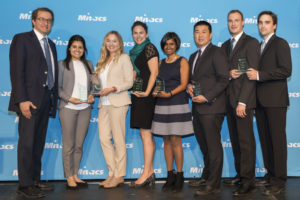Editorial:
Mark Mann
Financial incentives go a long way, but they’re not the only solution to talent retention.
StatCan report on foreign firms signals promise and peril for Canada’s innovation sector
A Statistics Canada report on foreign firms operating in Canada points to both crisis and opportunity for the country’s innovation ecosystem.
Pre-budget submissions for 2019 seek improved R&D tax credits and stronger space policy
Submissions to the House of Commons Standing Committee on Finance (FINA) in advance of Budget 2019 seek better R&D tax credits, more space investments, and a bigger Strategic Innovation Fund, among other things.
CIFAR unveils first cohort of AI chairs at Pan-Canadian AI Strategy annual meeting
The first Pan-Canadian AI Strategy annual meeting (AICan) convened in Montreal on December 3 to announce its initial cohort of 29 Canada CIFAR Artificial Intelligence (CCAI) Chairs.
Canada takes note as Europe moves swiftly on open-access publishing
An international consortium of research funders is moving rapidly to transform academic publishing. Known as Coalition S, the group has approved a plan that requires full and immediate open access to research funded by national and European research councils and funding bodies, beginning January 1, 2020. Canada is not part of the consortium, but it could feel the impact.
Opinion Leader:
Alex Navarre
The gap between universities and industry is fading, but can government programs keep up?
Universities and industry have made progress adapting to new realities for entrepreneurship and innovation, but government programs are still catching up.
Canada drops research networks and unveils new “high-risk” fund
The New Frontiers in Research Fund will supplant the Networks of Centres of Excellence (NCE) program, a flagship science and innovation policy initiative that has been a centrepiece of Canadian science for nearly 30 years.
Canada's automotive R&D 'surging,' despite GM's Oshawa plant closing
Automotive R&D and innovation is growing in the Toronto-Waterloo technology corridor, despite General Motors Oshawa assembly plant closing.
NRC launches fresh approach to collaboration with new microfluidics hub at UofT
Canada’s National Research Council has partnered with the University of Toronto to launch an innovation hub for the rapidly advancing field of microfluidics, called the Centre for Research and Applications in Fluidic Technologies (CRAFT).
Naylor recommends 'Team Canada' strategy to reach country's full potential in science
Speaking on a panel at the 2018 Canadian Science Policy Conference in Ottawa, Naylor affirmed that the federal government, provinces and territories need to do a better job at coordinating research funding and priorities if Canada wants to make the most of its investments.
News Bites
News Briefs
Quebec institutional investor Caisse de dépôt backs Montreal AI accelerator
The Montreal Institute for Learning Algorithms (MILA) and Caisse de dépôt et placement du Québec (la Caisse) have partnered to accelerate development of AI in the region. With backing from la Caisse, MILA is establishing a new Espace CDPQ | Axe IA in a converted 370,000-sq.-ft. factory called O Mile‑Ex Complex in Montreal’s Little Italy, just up the street from the new offices of the large AI-commercialization firm Element AI. The complex will host AI startups from various sectors with projects that reflect MILA’s values. Participating companies are required to bring AI products to market on an accelerated timeline with help from CDPQ | Axe IA and participate actively in the MILA community. Other selection criteria included short, medium, and long-term R&D ambitions, and synergy with Montreal’s AI ecosystem. MILA is one of three institutes that form the core collaboration underpinning the Pan-Canadian AI Strategy.
FedDev Ontario commits $1.2 million to support innovation at McMaster Univeristy
Newly opened Canadian Statistical Sciences Institute (CANSSI) will foster multi-sector collaborations
University of Calgary opens collaborative research hub in old downtown library
The Calgary Municipal Land Corp (CMLC) and the Faculty of Environmental Design (EVDS) at Univ of Calgary have teamed up to open a collaborative research hub and event space in the city’s former central library branch. The new centre will follow other significant redevelopment in Calgary’s East Village and joins a trend of street-level transformations in the area. EVDS wants the 29,000-sq.-ft. satellite space to serve as a nexus for engaging public discussion and exploring innovations in design, construction, and operational management. The hub will support Univ of Calgary’s strategic priority to create collaborative opportunities for students, researchers and companies to interact in ways that propel research and innovation. EVDS will take occupancy of the building in January of 2019.
Suncor joins Quebec companies on CO2 capture and utilization project
Suncor Energy in Alberta has joined a CO2 capture and utilization project led by CO2 Solutions Inc., based in Quebec City. The Valorisation Carbone Québec (VCQ) project aims to develop and demonstrate commercially viable, end-to-end solutions to capture and transform carbon dioxide into fuels and bio-products while reducing GHG emissions. The project is supported by $22.5 million in grants from the Quebec government, with monetary investments and/or in-kind contributions from project partners, including Université Laval, France-based Total S.A. and Parachem, a limited partnership jointly owned by Suncor (51%) and Société Investissement Québec (49%). The VCQ demonstration phase will take place at Parachem’s industrial site in Montreal and includes design, construction, installation and operation. In August, CO2 Solutions received a $375,000 contribution from Natural Resources Canada toward reducing cost and improving performance of the company’s carbon capture technology.
Trudeau announces $230 million for Montreal artificial intelligence supercluster SCALE.AI
CANARIE awards $3.2M to nine research teams
Canada’s National Research and Education Network (CANARIE) has awarded a total of up to $3.2 million to nine research teams to develop research data management software tools. The new funding is part of the Government of Canada’s $105-million investment supporting CANARIE, which operates an ultra-high-speed network connecting researchers, through its 2015-2020 mandate. The teams will develop software components and tools that enable Canadian researchers to adopt best practices in managing various types of research data, including in the areas of human health genomics, geospatial studies and brain disorders. Effective research data management practices maximize investments in science and can accelerate discovery by simplifying access to data generated from scientific research, said Mark Wolff, chief technology officer at CANARIE. Two of the nine teams are based at University of Toronto, and one team each at University of Prince Edward Island, McGill University, University of Saskatchewan, University of British Columbia and University of Victoria. The other two teams are from the Computer Research Institute of Montréal and the Ontario Brain Institute.
Seneca and KUKA Canada partner to enhance automation training for students
ISED announces new Women Entrepreneurship Knowledge Hub to be led by Ryerson
New regional innovation program to support business development and growth
Lockheed Martin invests US$4M in University of Alberta spinoff company
Centennial College opens applied research facility in Scarborough
Digital Technology Supercluster kicks off with $153 million ISED funding
ISED invests $28 million in massive new poultry facility in Ontario
B.C.'s tech sector growing revenues, GDP faster than other provinces
British Columbia’s tech sector has earned its first “A” grade in economic performance indicators when compared with other Canadian provinces’ tech sectors, in the British Columbia Technology Report Card, published every other year by the BC Tech Association and KPMG. The report card rates the performance of B.C.’s tech sector in provincial and global economies, as well as its potential to grow. Revenues and GDP in B.C.’s tech sector are growing faster than tech sectors in other provinces, according to the report. On sector input indicators, however, B.C.’s tech sector received a “B-,” due to a tech talent shortage and not enough tech companies scaling up beyond the startup stage. Overall, B.C.’s tech sector was awarded a “B” grade versus other provincial tech sectors, up from a “B-” in the previous report. B.C.’s tech accounts for 7% of the provincial economy and is ranked first among the province’s industries in terms of growth. During the last two years, the tech sector’s revenues have increased by 11%.
Innovative Solutions Canada launches three new challenges to Canadian SMBs
Innovation, Science and Economic Development (ISED) minister Navdeep Bains has announced a new round of challenges through the federal procurement program Innovative Solutions Canada (ISC). Launched late last year, ISC is designed to support R&D at small and mid-size businesses by inviting them to create products that answer specific government needs or requests. Winning businesses can pass through a three-phase process, receiving up to $150,000 for R&D in Phase 1 and up to $1 million to create a working prototype in Phase 2. In the third phase, the government helps the company commercialize the product by acting as first customer. The latest round of challenges come from National Research Council Canada (NRC): 1) develop tech to mould composite material for body armour; 2) develop tech to improve how robots physically interact with humans; and 3) develop a simulation tool to help aerospace manufacturers produce more cost-effective composite material structures.




 The Centre of Excellence in Next Generation Networks (CENGN), an industry-led consortium helping accelerate the commercialization of next generation communications solutions, announced the appointment of a new CEO, Jean-Charles (JC) Fahmy, effective June 4. Fahmy is an alumnus of McGill Univ (MBA) and Univ of Ottawa (BASc in Electrical Engineering). He has more than 20 years of industry experience, most recently as VP for product management and business development at Coriant, an independent telecommunications company doing networking solutions. He has also held senior leadership positions in other telecommunications companies and private equity, including Nortel Networks, BTI Systems and Marlin Equity Partners. The CENGN consortium includes big telecommunications and networking companies, academic institutions and researchers working with small and mid-sized firms. It is a federally funded Centre of Excellence for Commercialization and Research (CECR). It also gets support from the Ontario Centres of Excellence (OCE). As CENGN CEO, Fahmy is tasked to manage the day-to-day operations of the not-for-profit, and lead and direct a team of over 30 engineering, technical, and professional staff. He also acts as the chief ambassador who engages with stakeholders, the R&D ecosystem, and the information and communication technology sector.
The Centre of Excellence in Next Generation Networks (CENGN), an industry-led consortium helping accelerate the commercialization of next generation communications solutions, announced the appointment of a new CEO, Jean-Charles (JC) Fahmy, effective June 4. Fahmy is an alumnus of McGill Univ (MBA) and Univ of Ottawa (BASc in Electrical Engineering). He has more than 20 years of industry experience, most recently as VP for product management and business development at Coriant, an independent telecommunications company doing networking solutions. He has also held senior leadership positions in other telecommunications companies and private equity, including Nortel Networks, BTI Systems and Marlin Equity Partners. The CENGN consortium includes big telecommunications and networking companies, academic institutions and researchers working with small and mid-sized firms. It is a federally funded Centre of Excellence for Commercialization and Research (CECR). It also gets support from the Ontario Centres of Excellence (OCE). As CENGN CEO, Fahmy is tasked to manage the day-to-day operations of the not-for-profit, and lead and direct a team of over 30 engineering, technical, and professional staff. He also acts as the chief ambassador who engages with stakeholders, the R&D ecosystem, and the information and communication technology sector.